
July 2010
Joseph Taylor's "On Music":
The First Hip White Person
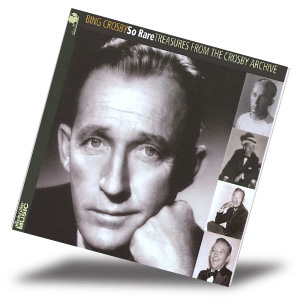 Bing
Crosby is perhaps little known to anyone born after 1970, but for 50
years he was an enormous star on records, radio, and film. Throughout
his career he appeared with and befriended great musicians, including
Eddie Lang, Joe Venuti, Louis Armstrong, Jack Teagarden, and Les Paul.
He was also admired by other singers. Frank Sinatra told journalist Pete
Hamill, "Everybody wanted to be Bing Crosby, including me." Although
Crosby is sometimes thought of as a pop crooner, jazz critic Ralph
Gleason wrote that he was "the personification of the whole jazz
movement -- the relaxed, casual, natural, uninhibited approach to art."
The jacket of Gary Giddens's Crosby biography quotes clarinetist Artie
Shaw on the singer: "The thing you have to understand about Bing Crosby
is that he was the first hip white person born in the United States." Bing
Crosby is perhaps little known to anyone born after 1970, but for 50
years he was an enormous star on records, radio, and film. Throughout
his career he appeared with and befriended great musicians, including
Eddie Lang, Joe Venuti, Louis Armstrong, Jack Teagarden, and Les Paul.
He was also admired by other singers. Frank Sinatra told journalist Pete
Hamill, "Everybody wanted to be Bing Crosby, including me." Although
Crosby is sometimes thought of as a pop crooner, jazz critic Ralph
Gleason wrote that he was "the personification of the whole jazz
movement -- the relaxed, casual, natural, uninhibited approach to art."
The jacket of Gary Giddens's Crosby biography quotes clarinetist Artie
Shaw on the singer: "The thing you have to understand about Bing Crosby
is that he was the first hip white person born in the United States."
Crosby was
an innovator in many other ways. He was an early advocate of magnetic
tape as a recording medium and gave one of the first reel-to-reel tape
recorders to his friend, Les Paul, who soon modified it for multitrack
recording. Crosby began pre-recording and editing his radio programs so
that he could control their quality and ensure that they could be
rebroadcast and archived.
Collectors' Choice Music and
Bing Crosby Enterprises have released six Crosby CDs, all of them
available for the first time on CD and three never previously available
in any format. Crosby maintained an extensive collection of his own
recordings, whether he did them for record companies or for radio. He
often traded tapes with other collectors and, according to the liner
notes for one of the Collector's Choice sets,
So Rare:
Treasures from the Crosby Archive
(CCM2109), he kept files
detailing his recordings. Two of the new CD releases,
So Rare
and
Bing on
Broadway (CCM2107) are largely culled
from the Crosby estate's archive of the singer's radio performances.
So Rare
begins with two songs from a 1931 radio appearance Crosby did for CBS soon
after he left Paul Whiteman's orchestra. The sound on "Just One More
Chance" and "I'm Through with Love" is unusually good considering the
age of the recordings, and Crosby was well on his way to finding his
voice. His accompanists include Joe Venuti, Eddie Lang, and Bunny
Berigan. Two years later, in a promotional appearance for Spanish
Paramount Pictures, Crosby
was
already losing some of the sweet crooning sound of the 1930s and
sounding more like the jazz-influenced pop singer he would become. By
1941, when he sang "Over the Rainbow" and "As Time Goes By" for the
Kraft
Music Hall radio show, he
was
stretching out notes and playing with the rhythm of the song, even as
the band bathed
him in strings. Crosby's singing seemed almost effortless at times, but
he was as rhythmically adventurous as Louis Armstrong or Sinatra.
The first disc of
So Rare
continues through the 1940s and to the late '50s, offering a surprise
1955 cover of Johnny Ace's "Pledging My Love," which Bing performed on
his radio show. Bing precedes the tune with a short dissertation on rock'n'roll, and he’s ambivalent, though not at all bitter, about the music. You
wouldn't take Crosby for a rock and roller, but he sounds surprisingly
comfortable with the song. The second disc continues through to 1976,
opening with a 1957 performance of "So Rare" that shows off Bing's jazz
chops with a small group. Five Jimmy Van Huesen tunes follow, and
Crosby's interpretative skills on those great songs demonstrate his
mastery of American songwriting.
Both discs show the singer's
ease with novelty tunes, great pop tunes, and show tunes. The six tracks
Bing recorded in 1966 and 1967 for Reprise, the label Sinatra
established, don't quite get off the ground, and two tracks from 1970
attempt to update him, with mixed results. But overall, So Rare: Treasures from the Crosby Archive
is a solid overview of the singer's career.
Because of the different sources and dates of the recordings, their
quality varies, though nothing on the disc sounds bad.
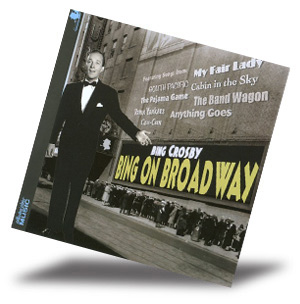 Bing On
Broadway
is composed of recordings
from Crosby's CBS radio show in the mid-1950s. Bing is accompanied on
all but two tracks by a quartet led by pianist Buddy Cole, a wonderful
musician who played with Crosby often. This set of 19 Broadway tunes
swings beautifully, and hearing Bing with such a simple backdrop
highlights his skills as a jazz singer. Compare his version here of
"Mandy" with the better known version in the film
White
Christmas. Crosby lays
behind the beat at points, just ahead at others, but he swings
effortlessly. His mastery of these tunes by the Gershwins, Rodgers and
Hart, Cole Porter, and others is consummate, and his versions sit
comfortably beside those of Sinatra and Ella Fitzgerald. Bing On
Broadway
is composed of recordings
from Crosby's CBS radio show in the mid-1950s. Bing is accompanied on
all but two tracks by a quartet led by pianist Buddy Cole, a wonderful
musician who played with Crosby often. This set of 19 Broadway tunes
swings beautifully, and hearing Bing with such a simple backdrop
highlights his skills as a jazz singer. Compare his version here of
"Mandy" with the better known version in the film
White
Christmas. Crosby lays
behind the beat at points, just ahead at others, but he swings
effortlessly. His mastery of these tunes by the Gershwins, Rodgers and
Hart, Cole Porter, and others is consummate, and his versions sit
comfortably beside those of Sinatra and Ella Fitzgerald.
John Scott Trotter and His
Orchestra give Crosby enjoyable support on two tracks, but it's Buddy
Cole's quartet that lets Crosby relax and cut loose on most of the disc.
Cole Porter's "It's All Right with Me" has a relaxed chamber jazz feel,
while "Get Me to the Church on Time" has a batty, brassy ring to it. "My
Heart Stood Still" features a gentle accompaniment from Cole, while
"Ain't Misbehavin'" gives the quartet and Crosby free, playful rein.
Crosby gives Cole and guitarist Vince Terri a few solo spots, which they
use to good effect. The recordings on
Bing on Broadway
have some background hiss, but nothing distracting on what is a highly
enjoyable collection.
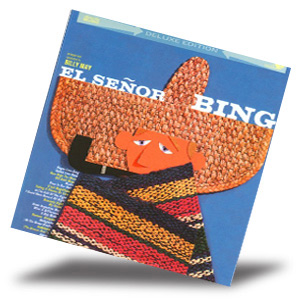 In 1960 Crosby grabbed Billy
May to arrange and conduct a batch of tunes with a Latin beat for
El Señor
Bing (CCM2108). May had worked with
Crosby before, as well as with Sinatra and other singers. Latin music
was a May specialty, and he put together ten charts for Bing, most of
them interpretations of popular songs. "In the Still of the Night / I
Could Have Danced All Night" is typical, with its brassy opening and
rattling Latin percussion. Crosby croons in a relaxed mood, and while he
doesn’t sound like, say, Dezi Arnez, his joy in singing with the Latin
accompaniment is infectious and the arrangements themselves are great
fun. All ten of the original tracks are medleys, combining "How High the
Moon" and "Old Devil Moon," for example (a high point on the set), or
"Pagan Love Song" and "Cuban Love Song." Those tracks, released in
stereo, are augmented here with recently discovered, very energetic mono
mixes that focus Bing's voice and integrate the percussion more
naturally behind him. In 1960 Crosby grabbed Billy
May to arrange and conduct a batch of tunes with a Latin beat for
El Señor
Bing (CCM2108). May had worked with
Crosby before, as well as with Sinatra and other singers. Latin music
was a May specialty, and he put together ten charts for Bing, most of
them interpretations of popular songs. "In the Still of the Night / I
Could Have Danced All Night" is typical, with its brassy opening and
rattling Latin percussion. Crosby croons in a relaxed mood, and while he
doesn’t sound like, say, Dezi Arnez, his joy in singing with the Latin
accompaniment is infectious and the arrangements themselves are great
fun. All ten of the original tracks are medleys, combining "How High the
Moon" and "Old Devil Moon," for example (a high point on the set), or
"Pagan Love Song" and "Cuban Love Song." Those tracks, released in
stereo, are augmented here with recently discovered, very energetic mono
mixes that focus Bing's voice and integrate the percussion more
naturally behind him.
Cole's quartet backs Crosby
for six more bonus tracks, recorded in 1954 to '55 for CBS Radio and
arranged in Latin style. "Papa Loves Mambo" had been a hit for Perry
Como, and Bing at times seems to be attempting an impression of the
younger singer. Drummer Nick Fatool handles the percussion chores
convincingly, and as with
Bing on Broadway,
one of the pleasures of these six tracks is
hearing Cole's versatile small group. Crosby had great affection for
music from Latin America, and it comes through on this collection.
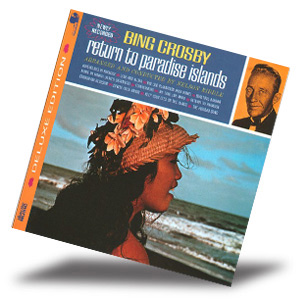 Nelson Riddle arranged for
Crosby only once, in 1963 for
Return to
Paradise Islands (CCM2105), which Bing
released on Reprise. The set of songs was chosen for its Polynesian
theme, some perhaps more for their evocative titles rather than their
South Pacific heritage. "The Hukilau Song," "Lovely Hula Hands," and a
couple of other tunes are full-on Hawaiian hokum, salvaged by Riddle's
subtle backdrop and Bing's voice. Crosby sounds terrific throughout, his
voice strong and steady at age 60. His ballad style was clearly an
influence on Sinatra's, and Riddle knows how to accent and highlight the
older singer's strengths.
Return to Paradise Islands
is a very nicely recorded and mastered title,
enjoyable if not essential to anyone but completists. Nelson Riddle arranged for
Crosby only once, in 1963 for
Return to
Paradise Islands (CCM2105), which Bing
released on Reprise. The set of songs was chosen for its Polynesian
theme, some perhaps more for their evocative titles rather than their
South Pacific heritage. "The Hukilau Song," "Lovely Hula Hands," and a
couple of other tunes are full-on Hawaiian hokum, salvaged by Riddle's
subtle backdrop and Bing's voice. Crosby sounds terrific throughout, his
voice strong and steady at age 60. His ballad style was clearly an
influence on Sinatra's, and Riddle knows how to accent and highlight the
older singer's strengths.
Return to Paradise Islands
is a very nicely recorded and mastered title,
enjoyable if not essential to anyone but completists.
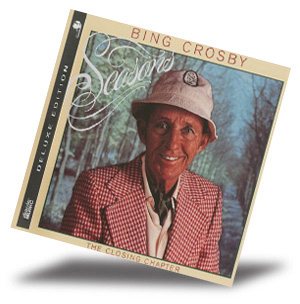 One month before Crosby died
at 74 on a golf course in Spain, he went into a London recording studio
with the Pete Moore Orchestra to record
Seasons
(CCM2104). Age had taken some of the smoothness from Bing's high notes,
but that only adds to the charm of these 12 tracks, to which the reissue
producers have added
13.
The arrangements have a 1970s flair, which occasionally dates them, but
the disc has some moving passages, such as Crosby's reading of "Summer
Wind."
Seasons is a
summing up, a statement of life’s passage as it closes. Crosby recorded
eight of the bonus tracks for the BBC on October 11, 1977, just three
days before he died. He sounds spry and happy to be singing. On the five
remaining tracks, Crosby reads poems by Kipling, Longfellow, and
Wordsworth to musical accompaniment, and the result is warm and
charming. One month before Crosby died
at 74 on a golf course in Spain, he went into a London recording studio
with the Pete Moore Orchestra to record
Seasons
(CCM2104). Age had taken some of the smoothness from Bing's high notes,
but that only adds to the charm of these 12 tracks, to which the reissue
producers have added
13.
The arrangements have a 1970s flair, which occasionally dates them, but
the disc has some moving passages, such as Crosby's reading of "Summer
Wind."
Seasons is a
summing up, a statement of life’s passage as it closes. Crosby recorded
eight of the bonus tracks for the BBC on October 11, 1977, just three
days before he died. He sounds spry and happy to be singing. On the five
remaining tracks, Crosby reads poems by Kipling, Longfellow, and
Wordsworth to musical accompaniment, and the result is warm and
charming.
The Bing Crosby discs in
this reissue series (it also includes
On the Sentimental Side
and
Bing Sings the Great American Songbook)
are elegantly packaged and include informative liner notes. The
mastering is very good throughout, and the recording quality,
particularly on
El Señor Bing and
Return to Paradise Islands is
excellent. Crosby made a vital contribution to American music, and these
discs are a good place to discover and enjoy his gifts.
. . . Joseph
Taylor
josepht@soundstagenetwork.com
|

